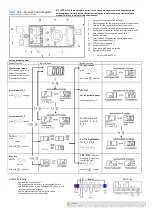
UNDERSTANDING UPS OPERATION
Eaton 9395 UPS (450–825 kVA) Installation and Operation Manual
S
164201725 Rev 4
www.eaton.com/powerquality
6-35
6.4
Multiple UPS Distributed Bypass System
Distributed bypass parallel operation extends the normal operation of Eaton 9395
UPSs by offering increased capacity and/or redundant capability. The parallel system
continues to maintain power to the critical loads during commercial electrical power
brownout, blackout, overvoltage, undervoltage, and out‐of‐tolerance frequency
conditions.
The output of the system is normally supplied by Uninterruptible Power Modules
(UPMs) contained in each UPS. Multiple
UPMs are connected with their outputs in
parallel (tied together) to provide a load level greater than the rating of one UPM, for
redundancy, or both. The paralleled UPMs supply the output load with protected
power as long as the load does not exceed the combined rating of the paralleled
UPMs.
The power system is redundant as long as one of the UPMs can be disconnected
from the output bus and the remaining UPMs can continue to supply power to the
load without exceeding their ratings.
When the load is being supplied by the UPMs, the system output bus is continuously
monitored for an overvoltage or undervoltage condition. If an out of limits condition is
detected, the paralleled UPMs transfer the load to bypass using the UPS static
switches.
Communication is required between the UPSs for system metering and mode control.
System level communication and control are accomplished using a Controller Area
Network (CAN). A single building alarm in each UPS, connected to the other UPSs in
parallel and tied to the bypass contactor auxiliary contacts in each UPS, are used for a
secondary communication path. This arrangement ensures bypass control even if the
CAN bus is lost.
The system is paralleled for redundancy (1+1) in a system where two UPMs are
paralleled together and the load is less than the supporting capability of one of the
UPMs. The system is paralleled for capacity (2+0) if both UPMs in a system are
required to support the load.
A parallel capacity system can also be redundant (2+1), as long as there is always one
or more UPMs online than required to support the load.
6.4.1
Multiple UPS Parallel System Modes
Similar to the single UPS system, the Eaton 9395 UPS parallel system supports a
critical load in five different modes of operation. The standard operation modes are:
NOTE
The Variable Module Management System and Energy Saver System modes are mutually exclusive.
S
In Online mode, the paralleled UPMs supply the critical load with clean, filtered
power. Each UPM battery charger also provides charging current for the battery if
needed.
S
In ESS mode, commercial AC power is supplied directly to the critical load through
the continuous static switch and transfers automatically to Online mode if an
abnormal condition is detected. The Energy Saver mode requires a UPS with a
continuous static switch. ESS mode in a parallel system operates the same as it
does in a single UPS system (see paragraph 6.2.3).
















































